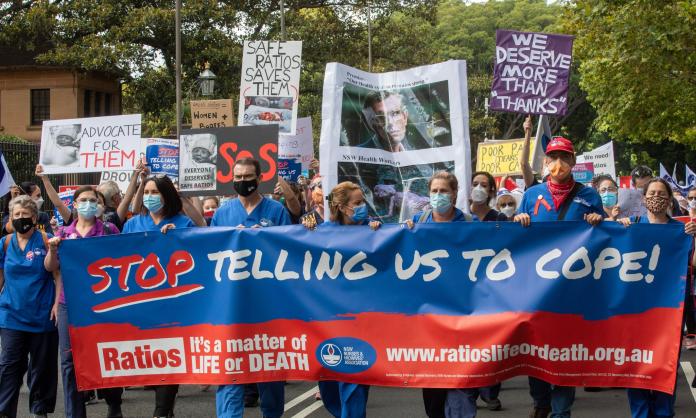Members of the New South Wales Nurses and Midwives’ Association (NSWNMA) will strike tomorrow, less than two months since our first state-wide strike in a decade. Most of the more than 160 branches that voted to strike have pledged to walk out for 24 hours, an escalation from February’s strike, when only a few hospitals committed to a whole-day action.
We are committed to fighting for pay and conditions in health care, and are serious about challenging the state government’s agenda to make workers’ pay for the crises that they are responsible for. The Berejiklian and Perrottet governments had more than a year to prepare the healthcare system for the waves of COVID-19 that began in 2021. Yet they failed to meaningfully increase staffing levels, they failed to ensure safe nurse-to-patient ratios, and they failed to adequately compensate nurses, midwives and other healthcare staff for working themselves to exhaustion to keep the healthcare system running.
We are proud to be part of the fightback against the state government by public sector workers. With inflation forecast to rise to more than 4 percent and the government still crying poor to justify its wage caps and insulting pay offers, we have more reason to fight than ever.
We have been inspired by the impressive state-wide teachers’ strike in December and the ongoing actions by the train drivers and staff in the Rail Tram and Bus Union. But if we want to push back the government’s entire anti-working-class agenda, we need to strike more and strike together. That’s why nurses and midwives in the Royal Prince Alfred Hospital Branch passed the following motion:
“RPA Branch of the NSWNMA calls on the rest of the public sector union to join us in industrial action. We have had enough of the attacks from the NSW government. We are stronger together.”
The other public sector unions (and all other unions for that matter) need to start taking the lead of the NSWNMA and ramp up their campaigns of strike action, not only in defiance of their employers and the government, but in defiance of bosses’ courts like the Industrial Relations Commission, which will likely declare the upcoming strike illegal, like it did in February. It is a rare sight to see a union defy the IRC or the Fair Work Commission and go ahead with an illegal strike, so the NSWNMA’s continued defiance should be an example for the whole movement to follow.
Anti-union laws have been defeated by strikes before, like in the NSW general strike of 1969, which freed jailed tramways union leader Clarrie O’Shea and rendered anti-strike laws practically useless. If we want to break the power of these bodies that contribute to making Australia’s industrial relations laws among the most hostile to workers in the developed world, we need to follow that example and strike against them.
We need a strong, independent union movement that will continue to use its industrial power, even if Labor forms government after next year’s state election. After all, it’s not just hospitals in NSW that are in crisis—this is a nationwide problem. Concessions offered to health workers by Daniel Andrews in Victoria are not sufficient to compensate for appalling conditions or to stem the mass exodus of workers from the profession. We need a socialist presence in the union movement that orients not to parliament, but to the workplaces, the classrooms and the hospital wards.
All unionists should join the public rally at 10am tomorrow (Thursday 31 March), Queens Square on Macquarie Street. Help us fight the Perrottet government.










